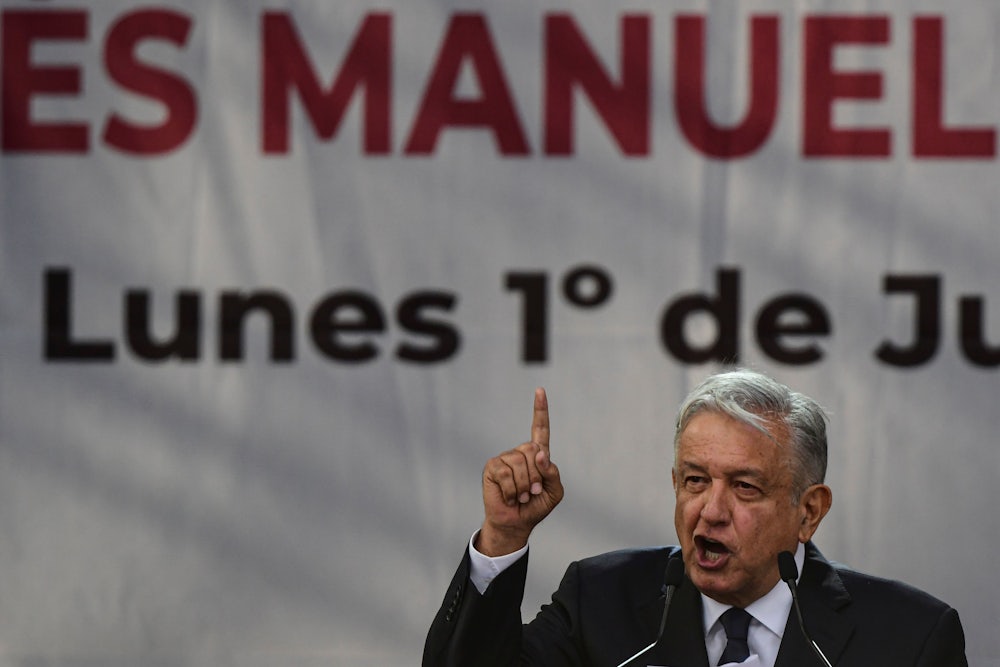On July 1, 2018, the night of the election of president Andrés Manuel López Obrador, I joined several friends to make our way to Mexico City’s Zócalo—the central square of this sprawling metropolis—where López Obrador would give his acceptance speech. Triumphant AMLO supporters flooded the streets. Firecrackers and car horns punctuated the celebratory hubbub. Confetti filtered through the air. Some people yelled out from their cars; some on the sidewalk sobbed with joy. As we crossed Paseo de la Reforma, a woman paused in front of us and cried out “Ganó el pueblo!”—the people won!
When the president-elect took the temporary stage on the Zócalo, people cheered and wept some more. The speech itself was characteristically uncharismatic. López Obrador thanked the crowd and assured the Mexican people that he wouldn’t let them down. What struck me that night, though, was the sense of optimism: the collective glimpse of another possible political order in Mexico, one not characterized by corruption, impunity, and violence. After the speech, in our slow parade away from the Zócalo, there arose from the crowd a familiar chant. It’s a slow count, starting at one. At 43, it ends with a cry: “Justicia.” It’s a cry for justice for the 43 students of Ayotzinapa, whose disappearances in 2014 have been linked to Mexican police and military forces. I’d heard this chant many times at rallies and marches, but always as a cry of anger and desperation, never before so propelled by an undercurrent of hope.
A year this week after that flicker of collective optimism, and six months after his swearing-in, López Obrador enjoys widespread public support. His approval ratings consistently rank around 70 percent or higher, a dramatic departure from his predecessor, Enrique Peña Nieto, whose highest approval was in the low 60s at his election, and progressively plummeted until he left office with a 28 percent approval rating. But López Obrador’s credibility on some of his most highly touted campaign promises is rapidly waning.
During the campaign, and through the early months of his term, López Obrador’s promises to demilitarize Mexico brought hope to those exhausted by the widespread terror of the 2006 militarization of the government’s war on drug traffickers. Then, earlier this year, the president proposed the formation of a new National Guard, intended to reduce violence and address organized crime. There was backlash from the human rights community, who criticized it as another form of militarization. The Senate and the Chamber of Deputies—the two houses of the Mexican Congress—approved AMLO’s plan in late February under the condition that it would be under civil, rather than military, command.
But after last month’s tariff threats from President Trump, the way in which López Obrador appeared ready to bypass civil government and human rights concerns—all to preserve his relationship with the United States—is giving many cause for concern. Despite once insisting he’d refuse to “do the U.S.’s dirty work” on immigration, López Obrador is using the National Guard to crack down on migrants crossing Mexico in their journey to the U.S. border. After negotiations with the Trump administration on reducing the number of migrants heading north, Mexico announced it would deploy the National Guard to combat migration. Though the National Guard legally has the authority to arrest migrants, its use specifically for immigration enforcement took the human rights community by surprise. The Guard’s deployment began in mid-June at Mexico’s southern border, and will continue to spread throughout the country—including in Mexico City, a move considered nearly without precedent—with 70,000 in position by year’s end. Despite being ostensibly a civil force, the body’s current commander is a military general, and its training is being done in military facilities. This new mobilization is composed of 60,000 naval, military, and federal police, all of which have a history of human rights violations, plus 10,000 new recruits. (On Wednesday, officers in the federal police protested the president’s initiative, objecting to working under military command, and voicing concerns about possible cuts in pay, rank, and benefits.)

Additionally, López Obrador has been quick to slander journalists and activists who don’t support his agenda. He’s publicly stated that his critics on the radical left are actually conservatives, and he’s repeatedly denigrated and threatened the opposition media. In one of his daily morning press conferences, the president commented to the journalists present, “If you cross the line, you already know what happens.” (He later said that he meant that the press self-regulates and “was responsible for its own actions.”) Weeks later, he referred to unfavorable news stories as “propaganda” spread by the “mob of journalism.” Mexico already has the ignominious distinction of being the country with most murdered journalists this year, and such attacks, however oblique, put at further risk those already working in one of Mexico’s most dangerous professions.
That’s not to say López Obrador’s administration has completely neglected addressing the human rights violations it inherited. The president has tried to position himself as an ally of the relatives of Mexico’s more-than-40,000 disappeared people, creating a National Search Commission in February. The slow pace of advances, though, has led some to insist that his supposed efforts perpetuate the same impunity and denial as previous governments. In December, as one of his first acts in office, López Obrador created a truth-and-justice commission to investigate the Ayotzinapa disappearances. The case was only assigned a prosecutor last week. While López Obrador’s government has publicly pledged to address the abuses of past administrations, it remains to be seen whether those acknowledgements will remain symbolic—and whether he’ll act out of a selective blindness to the abuses that occur under his government.
Monday marked one year since López Obrador’s jubilant supporters filled the streets of Mexico City. Just the day before, López Obrador led a ceremony to inaugurate the new National Guard, which then deployed into the city streets where Mexicans continue to call for justice.
